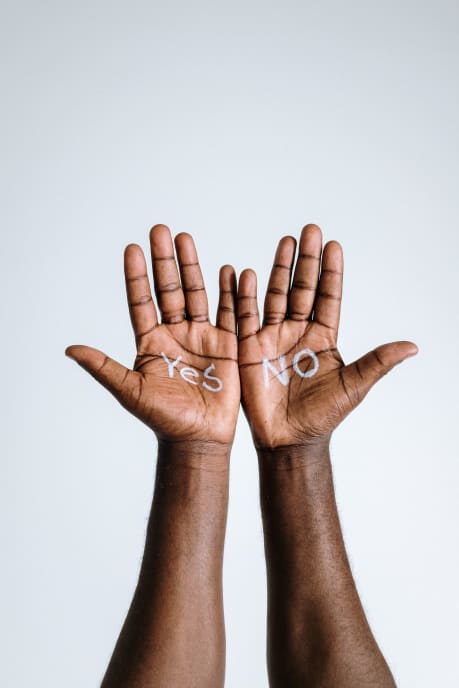The decisions you make, big or small, can have a huge impact on your life. Psychologist Magnus gives you a guide to making the right choices.
Five tips for making good choices
Establish good routines in line with how you want to live and what you want to achieve - it reduces the risk of making the small, bad choices.
Don't let the fear of discomfort stop you from pursuing what you want.
Avoid making big choices when you're in a bad place, if possible.
Accept that you can't predict the future - and that no choice offers any guarantees.
Define your values and what you want to achieve in life, let this act as a compass.
Your own lucky charm?
Many factors come into play when it comes to the direction our lives take; obviously heredity and environment, but let's not forget luck, bad luck and chance. There's a lot you can't choose, such as genes, parents or whether the car in the oncoming lane loses control. Despite this, life is full of choices.
She had been awake all night, finally it was 0800 and she could call her mum. She burst into tears as she said: "Mum, I'm so scared of making the wrong choice."
Every day we make thousands of decisions, some say as many as 35,000. Most are unconscious and automated, while others can be crucial to how life develops.
It's fair to say that life is a product of the decisions you make. If you were to choose one skill in life, you should choose the ability to make good decisions.
Two systems
In his critically acclaimed book Thinking, Fast and Slow, Israeli-American psychologist Daniel Kahneman shows that people often make decisions in inappropriate ways.
The brain consists of two systems: one that runs on auto and requires little effort, and one that runs slowly and requires strenuous mental activity.
The challenge is to switch on the slow system when important decisions need to be made. This can be challenging in practice.
Trust your gut?
There are two ways of making decisions: the instinctive and immediate, or the reflective and analytical.
The brain can be our best friend, but be aware that it often gives you what you think you need, and so you run the risk of letting it help you make a decision you really shouldn't have made.
People are often good at justifying choices - regardless of the quality of the choice.
The doctor told him to stay away from fast food, but he deserved that particular burger.
You might want to stop and use your slow thinking to assess whether the choice is really wise.

What is important to you?
You can never be sure you're making the right choice - simply because you can't predict the future.
But if you know something about what you want from your life, what is important to you and who you want to be, you have come a long way. Knowing this can act as a compass when you make decisions, big or small. If you don't know anything about this, make a map of what's important to you. Write down long-term goals. You can also create sub-goals that show the path to your goal.
If you don't know where you're going, it doesn't matter which path you take.
The small choices
You may not be aware of many of the small choices you make in your daily life. But even the small choices can affect your daily life. And one choice affects the next, most things are connected.
It was late on a Saturday, she was supposed to go to bed at midnight, but when her friends went out, she had to go with them. She had decided to go to school every day, but on Monday morning she still felt tired and stayed at home.
An important part of making good decisions is being aware of the importance of small choices. How do you think when you make decisions? Remember that a negative inner voice leads to more bad decisions.
If you can establish good routines in line with the way you want to live, you will be able to avoid many bad choices.
The big choices
In the novel The Dice Man, the main character, Luke, decides to let the dice decide everything. For most people, it's wise to take a more thoughtful approach to making decisions.
How do you come to a good enough conclusion? When are you sure enough to make a decision? Is the decision likely to stand up in the long term?
Often the fear of making the wrong choice can take up a lot of space. A 'pros and cons' list is never a bad idea, but often the challenge is more emotional, and whatever the choice, there is a lot of discomfort and uncertainty. It is a challenging situation to be in. One challenge is to accept that there are no guarantees. And to remember that life is lived forward but understood backwards, as Kierkegaard said.


Don't let the discomfort of a difficult choice "force" you to take the wrong direction.
Avoid bad choices!
A lot of research suggests that really bad choices are often associated with being in a bad place in life. You may have physical or emotional problems, or be in situations that are particularly stressful. In such situations, there is a risk that we will seek immediate comfort, at the expense of what is important in the long term. That's why it's important to recognise situations where you're in danger of making the wrong choice, and to raise the stakes.
His goal was to work with people and be able to help others, which is why he wanted to become a social worker. Now he was going through a demanding period of work experience, which was causing him a lot of stress, and he was considering dropping out. Suddenly he felt the old knot in his stomach and it made him think twice.
Very often, short-term discomfort can distract us from things that are really important to us. It's worth noting that we often stop doing good things when we need them most.
Accept discomfort
The best decision is not always the one that causes the least discomfort.
She had now made her decision. She was going to study to be a teacher, and she was going to say no to taking over the family farm. The thought of her parents' disappointment was enough to make her stomach turn.
Make good choices despite discomfort, such as a guilty conscience. And remember that it's easier to tolerate discomfort in the here and now if it's a step towards something important.
Good luck making the right choices for your life!
Need someone to talk to?
Know that SSN's counselling service is here for you if you need us. There is a therapist/psychologist on all campuses here in Southeast-Norway.







